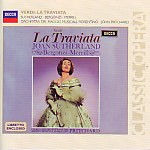This Traviata, recorded in 1962, was the first presented uncut, with both verses of the famous arias, intermediary passages, and the inclusion of both Alfredo’s and Germont’s cabalettas. That alone gives it value, but we also get to hear the three leads at their vocal best, and that’s a great deal. Sutherland’s Violetta is vocally astounding–secure, gorgeous at all dynamic ranges, full-bodied, fearless and light in Act 1, and grand elsewhere–and her notoriously poor diction had not yet reached rock bottom as it did three-or-so years later. Here she only loses all consonants and droops in some of the lower-lying, more introspective moments. Her joy and sadness are well-expressed, but she never gets much deeper–the terrible wounds inflicted on Violetta do not sear as they do with Callas, Cotrubas, and many other sopranos.
Carlo Bergonzi, always the classiest of tenors, is that and more. He sings with great urgency and passion and his natural morbidezza is nowhere heard to better advantage. Robert Merrill’s beautiful baritone is here in all of its splendor, but he’s two-dimensional. John Pritchard tends to rush at times but there’s no lack of tension. This performance does everything but touch the soul. You’ll know if you want this.
































